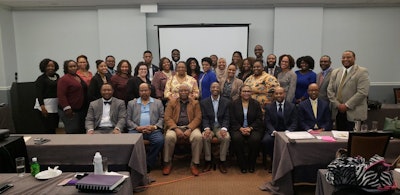NEW YORK – At the American Educational Research Association annual conference that ended here this week, early career scholars and advanced graduate students spent an entire day working with established researchers on questions and methods that inform studies on African-Americans in education.
Now in its 11th year, the Asa G. Hilliard III and Barbara A. Sizemore Research Course on African Americans and Education is a collaborative project sponsored by Wisconsin’s Equity & Inclusion Laboratory (Wei LAB) at the University of Wisconsin, Madison; the Urban Education Collaborative at the University of North Carolina, Charlotte; the Bell National Resource Center on the African American Male at The Ohio State University and the Center for the Study of Regional Competitiveness in Science and Technology at Washington University in St. Louis.
“Each year, we go through great lengths to structure the course to target potential pitfalls and content likely omitted from their formal doctoral program and department-based mentoring,” said Dr. Jerlando F.L. Jackson, co-founder of the course and the Vilas Distinguished Professor of Higher Education at the University of Wisconsin, Madison. “It is a meaningful part of my work to cultivate a research-focused experience that disrupts career barriers and glass-ceiling effects for scholars committed to explore the education experiences for African-Americans.”
 Participants in the 2018 Hilliard-Sizemore course at AERA
Participants in the 2018 Hilliard-Sizemore course at AERADr. Chance W. Lewis, who holds the Carol Grotnes Belk Distinguished Professorship in Urban Education at UNC Charlotte, said the course takes a comprehensive approach to providing selected fellows with what it takes to be successful in higher education while simultaneously conducting research that uplifts African-Americans in education.
“We provide real strategies on producing high-quality work, strategies for being productive over their entire careers and strategies for being successful and overcoming the unspoken riles of higher education,” said Lewis. “Alumni of this course are now serving in impactful roles in all areas of education.”
Indeed, alumni of the course like Dr. J. Luke Wood, the Dean’s Distinguished Professor at San Diego State University, who said the course was one of the most important development experiences that he’s participated in.
“It provided me with an opportunity to learn from and network with the highest scholars in my profession,” said Wood. “The insights and ongoing mentorship that started from this course enabled me to transition from being a doctoral student and traverse the ranks of academe to become a distinguished professor within 10 years. I am also not alone. There are a number of us who have been able to become full professors, many with endowed and distinguished titles, because of lessons learned from this program.”
Alumni of the course returned this year to talk to current fellows about how they’ve successfully navigated teaching while developing a robust research agenda about Black education.
Dr. Tonisha B. Lane, an assistant professor of Higher Education & Student Affairs at the University of South Florida, told the current fellows about how the course introduced her to the nuances of academic publishing, including how to explain her research design in journal manuscripts, deal with rejections and identify gaps in the literature to advance her scholarship.
 Dr. Jerlando F.L. Jackson
Dr. Jerlando F.L. Jackson“The course gave me a rare opportunity to secure a peer-reviewed journal publication coupled with a senior faculty member providing feedback for crafting this article,” said Lane, pointing out the research of Drs. Michael Nettles and Catherine M. Millett, who noted in 2006 that only 13 percent of African-American doctoral students engaged in academic publishing. “Hence, the course is filling a vital need for so many people.”
For Dr. James L. Moore, III, the Distinguished Professor of Urban Education and the Executive Director of the Todd Anthony Bell National Resource Center on the African American Male at OSU, the yearly gathering is an opportunity for him to spend quality time with advanced doctoral students and junior faculty who are interested in outlining strong research careers in the professoriate. He said that more than 200 scholars and researchers have participated in the course over the past 11 years.
“In many educational spaces, scholars who look like me and study issues related to Black education are questioned as to the relevancy for studying such a topic,” said Dr. Brian A. Burt, an assistant professor of Higher Education at Iowa State University. “The Hilliard-Sizemore course provided language on how to communicate the ‘so what’ of the research to an interdisciplinary audience. Equally important, the course helped me to think about how to carry out a rigorous research agenda that would withstand critique.”
Burt, who was a doctoral candidate when he participated, said that his emerging research interests on Black male persistence was affirmed in the course.
“In fact, it was in large part my participation in that course many years ago when the early idea of a research study on Black males in engineering graduate programs was advanced,” he said. “The course not only provided valuable presenters, but a scholar-mentor who talked with me one-on-one about my research idea. It was because of my participation in that course that I had the confidence to begin what has now turned into a six-plus year, multi-institution study. One publication based on this work was recently published and featured in Diverse: Issues In Higher Education.”
Jamal Eric Watson can be reached at [email protected]. You can follow him on Twitter @jamalericwatson






















